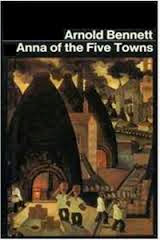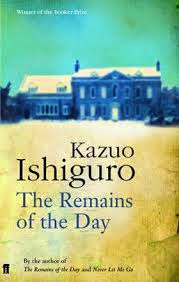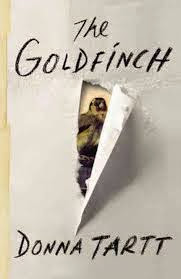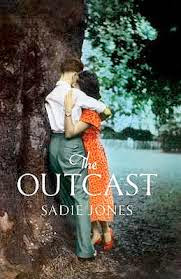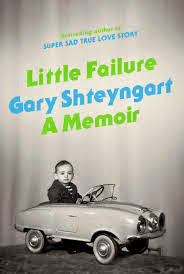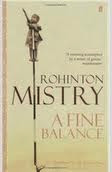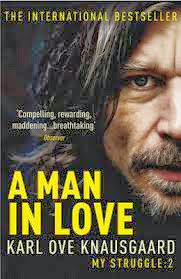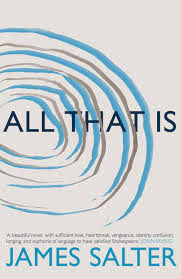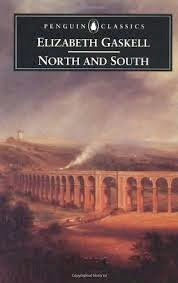Deciding what to read next is difficult. I don’t know personally very many readers who like what I like, so actual people are not much use; even apparently intelligent people will genuinely suggest that you should try THE DA VINCI CODE. Of late I have been using – though I feel like a capitalist lackey – Amazon’s suggestion based on “other people bought.” This is proving very successful, especially when tested against what the Guardian/Telegraph/NYT think. And so I found: A MAN IN LOVE by Karl Ove Knausgaard. I thought I would like it when I saw that Karl Ove’s inspiration was Proust, and like it I do. It’s 6 volumes across about 4000 pages, and his subject is his daily life. And despite the fact that he is not a super spy or international man of mystery, its engaging and charming, and I think I’m going to read it all over the next few years.
A MAN IN LOVE is Volume 2 of his series, which is bizarrely called MY STRUGGLE. It covers his move from Norway to Sweden, his marriage and first children. He gives you a detailed account of absolutely everything, and as with Proust, this is both boring and strangely comforting. The older I get, the more I coming to the conclusion that everyone’s life, when closely examined, is weird and embarrassing, and virtually nobody is leading the life we all feel we ought to be: rational, well thought out, properly managed. So for example, when Karl Ove (one can’t possibly call him Knausgaard) first meets his wife to be, she shows little interest, and he drinks too much and gets cuts from a broken mirror all over his face, and everyone knows why, and it’s horridly awkward. Then when they do get together, he is so happy when she kisses him for the first time that he actually faints. But then he still can’t help ogling women on the sidewalk, even while madly in love.
He explains what has pushed him to memoir: “Over recent years I had increasingly lost faith in literature. I read and thought this is something someone has made up. Perhaps it was because we were totally inundated with fiction and stories. It had got out of hand. Whereever you turned you saw fiction. All these millions of paperbacks, hardbacks, DVDs and TV series, they were all about made-up people in a made-up, though realistic world. And news in the press, TV news and radio news had exactly the same format, documentaries had the same format, they were also stories, and it made no difference whether whether what they told had actually happened or not . . . … The only genres I saw value in, which still conferred meaning, were diaries and essays, the types of literature that did not deal with narrative, that were not about anything, but just consisted of a voice, the voice of your own personality, a life, a face, a gaze you could meet. What is a work of art if not the gaze of another person? Not directed above us, nor beneath us, but at the same height as our own gaze. Art cannot be experienced collectively, nothing can, art is something you are alone with. You meet its gaze alone.
This is all very well, but sometime it degenerates into this: “I went into the supermarket down in the Metro station by Stureplan, bought a grilled chicken, a lettuce, some tomatoes, a cucumber, black olives, two red onions and a fresh baguette”. No, this is going anywhere. That’s his grocery list. There’s also a good hundred pages on a child’s birthday party during which he is bored. Yes, a hundred pages on a boring party. That takes balls.
On the other hand sometimes this daily detail is very fun, when he gives you a view of normal life in Sweden. Apparently, normal life in Sweden is mind bogglingly safe and controlled and modern. Karl Ove’s wife looks after the kids while he finishes a novel, and then he looks after them while she finishes drama school, and apparently he is just one of many men with hipster glasses pushing prams around Malmo. He hates domestic work, finds it boring and frustrating in a way I would say that women are not ‘allowed’ to, and as he puts it – re: the pram – “I was bound to it like Odysseus to the mast: if I wanted to free myself I could do that, but not without losing everything. As a result I walked around Stockholm’s streets, modern and feminised, with a furious nineteenth century man inside me.” Hilariously, for someone not from Scandinavia, one of Karl Ove’s biggest issues how foreign he feels as a Norwegian living in Scandinavia. Let’s try not to fall apart laughing, but as he puts it: “I know nothing about life here. Everything is deeply alien.” I hope in some later section of this project he has to go STRUGGLE with Mogadishu. I can’t wait to find out.
